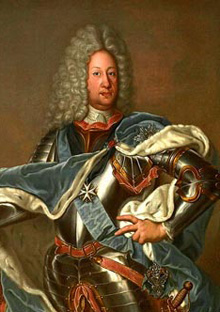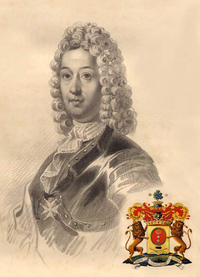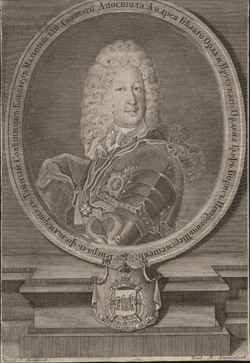|
 Boris Petrovich Sheremetev (1652 – 1719), Russian count (1706), military leader, diplomat, and a
general-field marshal during the Great Northern War. Before starting his military career, the young Sheremetev served as a page to
Tsar Alexis I of Russia. From 1671 he served at the imperial court. In 1681 he commanded the armies in the conflict with the Crimean Tatars,
and in 1682 he was elevated to boyar. From 1685 to 1687 he participated in the negotiations for the "Eternal Peace of 1686" which resolved the
hostilities with Poland. He also took part in the negotiation of the allied treaty with Austria. In late 1687, he took over the command of the armies
in Belgorod defending Russia's southern border, and participated in the Crimean campaigns. After Peter I gained power in 1689, he became his
fellow campaigner. He participated with Mazepa in the war against Turkey during the 1690s.
Boris Petrovich Sheremetev (1652 – 1719), Russian count (1706), military leader, diplomat, and a
general-field marshal during the Great Northern War. Before starting his military career, the young Sheremetev served as a page to
Tsar Alexis I of Russia. From 1671 he served at the imperial court. In 1681 he commanded the armies in the conflict with the Crimean Tatars,
and in 1682 he was elevated to boyar. From 1685 to 1687 he participated in the negotiations for the "Eternal Peace of 1686" which resolved the
hostilities with Poland. He also took part in the negotiation of the allied treaty with Austria. In late 1687, he took over the command of the armies
in Belgorod defending Russia's southern border, and participated in the Crimean campaigns. After Peter I gained power in 1689, he became his
fellow campaigner. He participated with Mazepa in the war against Turkey during the 1690s.
 During the Azov campaigns in 1695–96 he commanded
the armies along the Dnieper River in the battles against the Crimean Tatars. During the Great Northern War (1700–1721), Sheremetev proved
to be a capable but cautious and somewhat slow-moving military leader. During the war he was the commander-in-chief and most senior officer in
the Russian army along with the Tsar's great friend, the much more impulsive Prince Menshikov. Although Sheremetev was very careful in his
movements, his approach proved to be more effective than Menshikov’s whose impulsiveness was not always successful. In 1700 Sheremetev
participated in the Russian army’s attack on Narva at the outbreak of the Great Northern War but was driven back from his position in Estonia
by Charles XII of Sweden.
He then commanded the Russian forces in their fight against the Swedish armies in the Baltic provinces. Sheremetev
was subsequently defeated by W. A. Schlippenbach at Rauge in 1701 but later prevailed at Erastfer (Erastvere). This victory won him the title of
field marshal.
During the Azov campaigns in 1695–96 he commanded
the armies along the Dnieper River in the battles against the Crimean Tatars. During the Great Northern War (1700–1721), Sheremetev proved
to be a capable but cautious and somewhat slow-moving military leader. During the war he was the commander-in-chief and most senior officer in
the Russian army along with the Tsar's great friend, the much more impulsive Prince Menshikov. Although Sheremetev was very careful in his
movements, his approach proved to be more effective than Menshikov’s whose impulsiveness was not always successful. In 1700 Sheremetev
participated in the Russian army’s attack on Narva at the outbreak of the Great Northern War but was driven back from his position in Estonia
by Charles XII of Sweden.
He then commanded the Russian forces in their fight against the Swedish armies in the Baltic provinces. Sheremetev
was subsequently defeated by W. A. Schlippenbach at Rauge in 1701 but later prevailed at Erastfer (Erastvere). This victory won him the title of
field marshal.
 After another victory in the battle of Hummelshof, he took the fortresses of Nöteborg and Nyenskans in 1703 (which allowed the
foundation of the city of Saint Petersburg), and the important Baltic cities Dorpat (now Tartu) and Narva in 1704. In 1705 he was sent to Astrakhan
where he forcefully and successfully repressed the Astrakhan revolt. Later in the Great Northern War, Sheremetev clashed with the Swedish
general Lewenhaupt, who beat him at Gemäuerthof in 1705, and with Charles XII who defeated him at Holowczyn. His revenge came in the Battle
of Poltava where he and Prince Menshikov were the senior commanders in the decisive defeat of the Swedish army. In 1710 he led the Russian
armies in their conquest of Riga. In 1711 Sheremetev took part in unsuccessful Prut campaign against the Turks. During the years 1715–17 he
commanded armies in Pomorze and Mecklenburg. He died in 1719 in Moscow and is buried in St.Petersburg.
After another victory in the battle of Hummelshof, he took the fortresses of Nöteborg and Nyenskans in 1703 (which allowed the
foundation of the city of Saint Petersburg), and the important Baltic cities Dorpat (now Tartu) and Narva in 1704. In 1705 he was sent to Astrakhan
where he forcefully and successfully repressed the Astrakhan revolt. Later in the Great Northern War, Sheremetev clashed with the Swedish
general Lewenhaupt, who beat him at Gemäuerthof in 1705, and with Charles XII who defeated him at Holowczyn. His revenge came in the Battle
of Poltava where he and Prince Menshikov were the senior commanders in the decisive defeat of the Swedish army. In 1710 he led the Russian
armies in their conquest of Riga. In 1711 Sheremetev took part in unsuccessful Prut campaign against the Turks. During the years 1715–17 he
commanded armies in Pomorze and Mecklenburg. He died in 1719 in Moscow and is buried in St.Petersburg.
|
 History
History
 Dates and events
Dates and events
 Persons
Persons
 Poltava
Poltava
 Sights
Sights
 Photo gallery
Photo gallery
 Maps
Maps
 Virtual Museum
Virtual Museum
 Armament
Armament
 Uniforms
Uniforms
 Coins and medals
Coins and medals
 Flags
Flags
 Paintings
Paintings
 Poltava photographs
Poltava photographs
 News
News
 About us
About us
 Acknowledgments
Acknowledgments
 Main page
Main page
 top
top ...back
...back  History
History
 Dates and events
Dates and events
 Persons
Persons
 Poltava
Poltava
 Sights
Sights
 Photo gallery
Photo gallery
 Maps
Maps
 Virtual Museum
Virtual Museum
 Armament
Armament
 Uniforms
Uniforms
 Coins and medals
Coins and medals
 Flags
Flags
 Paintings
Paintings
 Poltava photographs
Poltava photographs
 News
News
 About us
About us
 Acknowledgments
Acknowledgments
 Main page
Main page